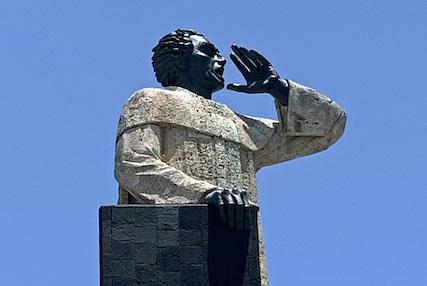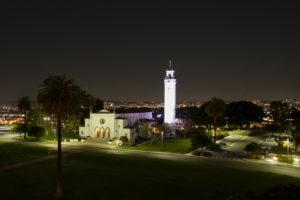MISSION AND MINISTRY | The Center for Religious and Spirituality invites the LMU community to a webinar “Biblical Narratives for Dismantling Racism” on Wednesday, May 12, from 7 p.m. to 7:45 p.m. PDT, featuring Professor Juan Escarfuller. “We’re in a moment when it’s important to understand that the Bible is not silent on these types of matters,” said Robert Hurteau, director of the Center for Religion and Spirituality. “The children of Israel were slaves in Egypt, and God was on their side when they sought liberation and justice.”
Historically, people have used the Bible to promote slavery and racism. “But we are going to do deeper work, which is … the next stage, where we look with eyes open at the pain and the suffering racism has caused,” said Escarfuller. “You can say racism hurts everybody, but it obviously pains certain people in a different and deeper way. Especially if you’re darker skinned.”
Escarfuller said he has four major goals that he hopes to accomplish during his discussion. First, to have the honest reckoning of how the Bible has been used to justify racism and injustice. Second, he will review the biblical texts that help denounce slavery and racism. Third, he wants to provide concrete tools and references for people to utilize to end systematic racism. Finally, Escarfuller hopes people will be inspired by the webinar to do the hard work to end racism.
“I want people to find a scriptural home,” said Escarfuller. “So, what are the passages, especially when we are confronted by tough realities, whether another young Black man was just shot by the police or you’re having a come-to-Jesus deep conversation about critical race theory and systemic racism. What are the biblical verses or stories that inspire you to not run away?” said Escarfuller. “Let’s not go back to denial but instead turn toward the Lord and say, ‘this is going to be hard but I trust that that You are the way.’ Then I will find a way both towards truth and reconciliation.”
Escarfuller said he sees God and Jesus as allies for the dignity of all people, regardless of their skin color. “There was a preferential option, not just towards the poor, but also towards people of color, in the Bible,” said Escarfuller. The parable of the Good Samaritan is his favorite biblical story for inspiring him during these conversations about “the other.” Escarfuller believes that both people – the Samaritan and the person healed – were saved by each other.”
Another source of inspiration for Escarfuller comes from Virgilio P. Elizondo, a theologian who grew up in a town on the border between Texas and Mexico. He suggested two principles that resonate with Escarfuller. The first one is the Galilean principle: “What the world rejects, God makes God’s own,” said Escarfuller. “This is a way of telling those who are oppressed or rejected by the world those they are part of the Kingdom of God.” The second one is the Jerusalem principle, “Which is this: you have got to go and speak truth to power. With all the gifts you’ve been given, you realize no matter how much the world has rejected you, God is counting on you.”
This webinar will air on Facebook Live. Click here to visit our Facebook page. Participants are invited to ask questions via the comments section of the livestream. For further information, please e-mail the Center at crs@lmu.edu. Juan Escarfuller will teach an online course on this subject in June.




